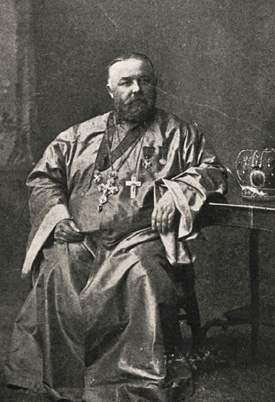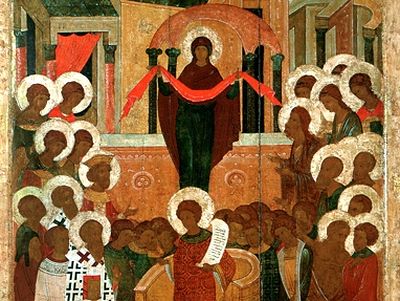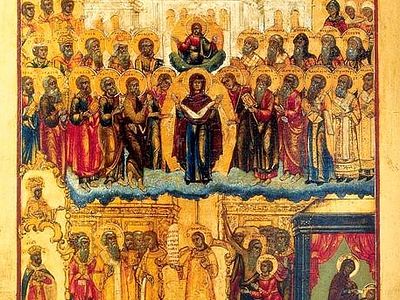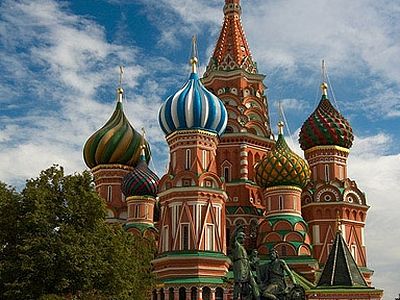St. Alexis Toth, canonized by the Orthodox Church in America and remembered for bringing thousands of Carpatho-Russian Uniates back into the fold of the Orthodox Church. These were immigrants to the United States, who lived through all the hardships of immigrant life in the late nineteenth, earlier twentieth centuries. St. Alexis gave them hope and encouragement in their new homeland.
On the feast of the Protection of the Mother of God, St. Alexis gave a sermon to his flock in Minneapolis, Minnesota.
* * *

In the name of the Father and the Son and the Holy Spirit.
Orthodox people!
Today we celebrate the festivity of the Protection of the Mother of God. The Church is dedicated and blessed by this name, far from our Fatherland. But anyplace wherever we would be, the Lord's Mother is with us! She hears our prayers to Her. She is also here in Minneapolis and She hears our prayers. She sees when you put candles before her icon requesting for yourself, your homeland and your friends Her assistance and protection.
Our forefathers from the eternal times have zealously celebrated this holiday. Our Rus' 900 years ago was a great and cultural state, confessing one religion. But then Rus' was divided into separate principalities and princes began not only to quarrel among themselves but even to fight each other. The Lord punished Rus' and the princes. From the East came the Mongolic horde—our forefathers were too weak because of their internal wars and besides that there was no unity among them. As a result they were conquered. For centuries Russians were taken to the slave markets where they were sold.
 St. Alexis Toth
St. Alexis Toth
In Lithuanian-Russian territories there was also persecution of the Orthodox people and as result of that, one after another principality went over to the Muscovite State. All the lands of Rus' were included in the Russian state with the exception in the West of Galicia, which was part of Poland and the Carpathian Rus' which became part of the Austro-Hungarian Empire.
In many cities of Rus', churches were built honoring the Mother of God.
Having baptized Rus', the Greeks did not give the Russians the holiday of the Holy Virgin Protection. Being under the yoke of foreign occupation, the Rus' heard from the Greeks that sometime ago the Mother of God came to the church in Czargrad[1] and saved the Greeks from the Saracens. Being under foreign occupation the Russian people and their princes looked for Heavenly protection from the Lord's Mother. Prince Andrew Bogoliubsky called on bishops and it was decided that the Mother of God is the Heavenly Protector of Rus' and for that reason the holiday of the Holy Virgin Protection was established and Rus' became the Holy Virgin's home. This holiday is celebrated only by the Orthodox people and only in Eastern Europe; neither Catholics nor Protestants celebrate it.
The Mother of God did not leave our forefathers without Her protection and when they called on Her, being surrounded by the Turks in Azov during the siege of the fortress,[2] She came to help them. Five thousand Cossacks and about one thousand Cossack-women were defending the fortress from an army of over two hundred thousand. In the night the defenders of the fortress brought to the wall the icon of the Holy Virgin Protection and prayed to Her, leaving themselves to Her mercy. In the morning when it became light, the Cossacks saw that the Turkish army was loaded on their ships and had gone to sea. From that time on all Cossacks began to count the holiday of the Holy Virgin Protection as not only their religious but a Cossack holiday.
Many times later, the Russians turned for protection to the Lord's Mother, taking with them on long travel or military expeditions the icon of the Holy Virgin Protection.
The traditions and holidays of our ancestors we do not have the right to forget. Each nation has its own religious and national holidays and costumes and preserving the memory of the ancestors, they protect and treasure them.
Our holiday of the Holy Virgin Protection is especially important for us since we came here from far away from our homeland. It is not easy for our parishioners with difficult work at the woodcutting and flourmill facilities. But the most tragic is that here, in this free country, we do not get the chance and opportunity to believe in God, to celebrate our own holidays and keep our traditions as we did in our homeland.[3]
Let's all together turn to the Mother of God, putting a candle in front of Her icon and ask Her to spread Her shroud, to help and protect us in our new country. Amen.
* * *
From The Writings of St. Alexis Toth: Confessor and Defender of Orthodoxy in America, translated and edited by George Soldatow (Aardm Press, Minneapolis: 1994).



